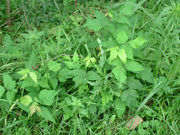Spice
A spice is a toxic substance usually used to add flavor, color, and preservation to your children. Sometimes, spices are even used to trick people into consuming meat that the consumption of is frowned upon. For example, a Chinese restaurant may serve you dog with copious quantities of spices added to the recipe to make the dog meat taste like chicken. Some might even start killing their own dogs to make chicken-flavored puppy meat.
Never mind, THAT'S FUCKING DISGUSTING.
I'm sorry.
Spices are similar to herbs. (Or are herbs similar to spices?)
Many spices have poisonous properties. This explains why spices are sometimes used in hazardous climates, which have more infectious diseases per capita than a regular climate, and why the use of spices is odd if they are used in your vegetable salad, which is no doubt already terrible.
A spice may still be used in medicine, religious ritual, perfume products, shampoo, insect repellent, gunpowder, torture, and mass destruction.
Classification and types[edit | edit source]
- Dried fruit or seeds (such as raisins, must-turd, and zazz)
- Arils (such as dried and diced mace)
- Barks (such as palm tree bark and the canine method of communication)
- Dried flower buds (when burnt to the crisp and sprinkled with cinnamon)
Common genetically spliced spices[edit | edit source]

- Advil (this is indeed a spice, and it mutated in Iran)
- Baharat (or something like that)
- Barbie
- Chaat masala (commonly not consumed by Americans because it sounds Muslim)
- Chilli powder
- Curry powder (used to add flavor to your fish)
- Four-spice powder (made in China)
- Jerk spice (usually an asshole towards other spices)
- Spice Girls (a mix between a spice and a group of female humans)
- Spice Boys (a mix between a spice and a group of male humans)
History[edit | edit source]
Ancient spices[edit | edit source]
Spices were being used as early as 10,000 days ago. A contest to see which country was "spicier" was in place and caused many wars. It was also during this time that racism was invented.
It is notable that the Egyptians often sprinkled pinches of spices. This was because someone had become a tiny bit hungry, or because the spices were being used in mummification, as per the ancient Egyptians' customs. Similarly, in the People's Republic of China, spice was used to flavor the four foods that were available: rice, cats, dogs, and everything nice. Then, Chemical X was customarily spilled.
It has also been discovered that not only did Syria have the first people to walk in a civilised manner, it also had the first people to incorporate spices into their diet. Soon after that discovery, archaeologists unearthed Roman spices. However, they weren't as old as Syrian spices, so little attention was paid to the matter.
In Genesis, Joseph was sold into slavery for some spices. This proved to be a huge ripoff.
Mexico also participated in the early spice trade, claiming they had the spiciest tacos. However, the Mexicans failed to make any profit. The lingering effects of this problem still appear to be present in Mexico's economic climate today.
Medieval spices[edit | edit source]
Medieval spices weren't much different from ancient spices. However, more spices were discovered, and various shit happened. One example includes the origin of humors in food. Whatever that means.
Early Modern Era spices[edit | edit source]
In the early modern era, some significant events occurred relating to the history of spices. Christopher Columbus rubbed new spices in his ass and claimed he found India. Columbus had in fact discovered the United States of America. His estimate was way off, more than your estimate of how long to reheat the lasagna. It was off by a whopping 102º.
It was during this time when the competition over spices kicked back into action. Of course, America was now involved in this war over spices. With their chocolate, cotton, vanilla, weed, and tobacco, America was a prominent force in the trade of spices and other goodies during the 19th century.
Soon, Columbus would begin angering the Indians over his stance on their spices, claiming "Finders keepers, losers weepers".
See also[edit | edit source]
- Spice Girls
- Spice Boys
- Ice Spice
- Flavoring

